FLARE 2023 – Nairobi
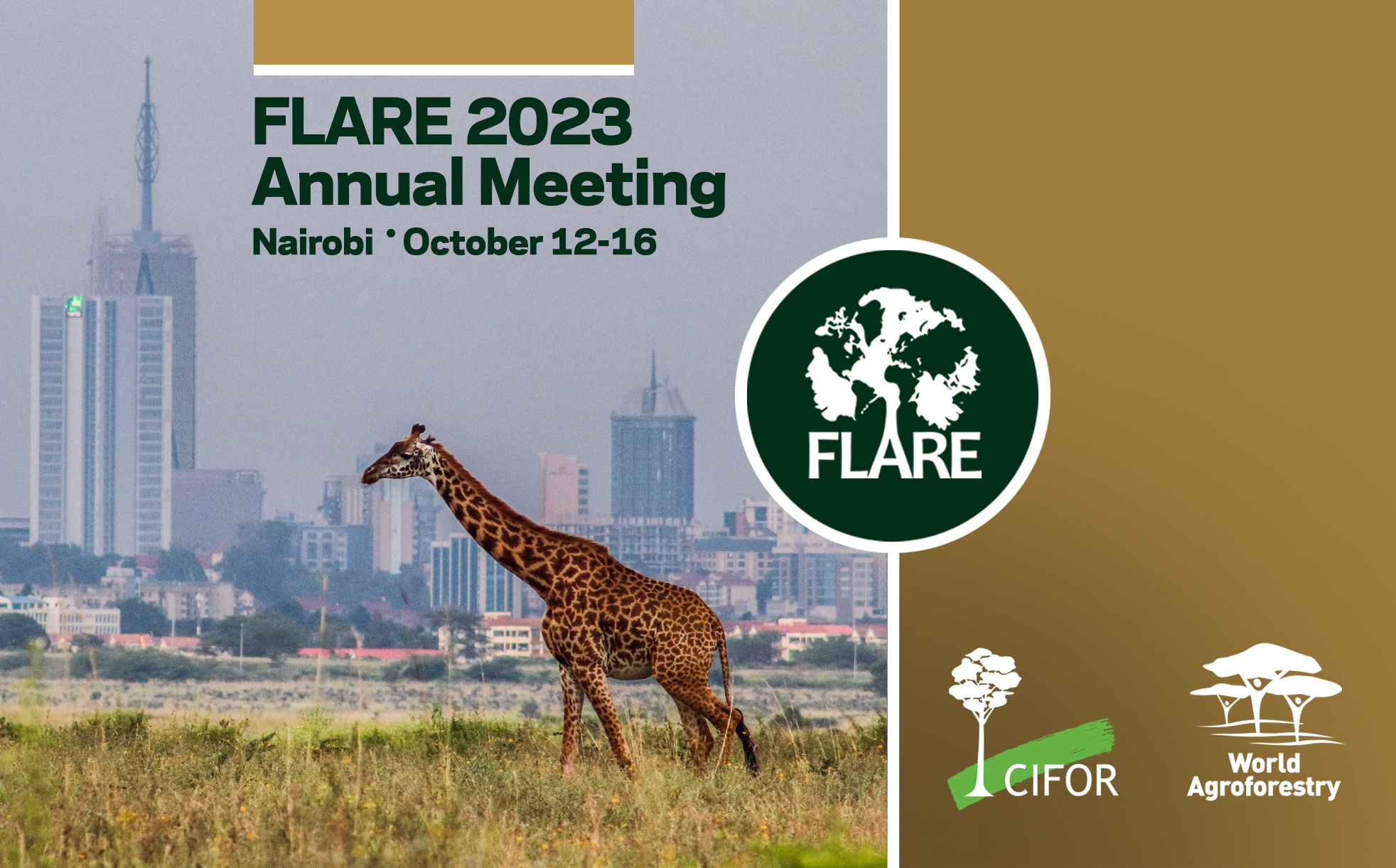
The 2023 FLARE Annual Meeting was held October 12-16 in Nairobi, Kenya in partnership with CIFOR-ICRAF.
2023 FLARE Annual Meeting - Official Photos
Please reach out to the FLARE Secretariat if you would like a copy of a photo from the 2023 Annual Meeting.
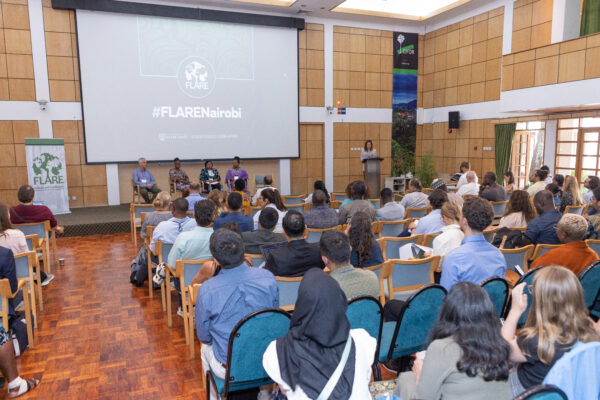
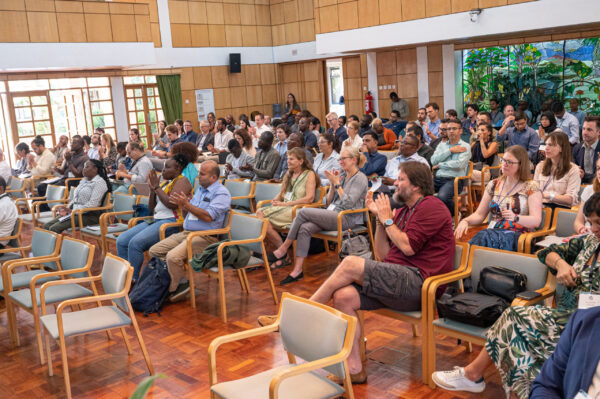
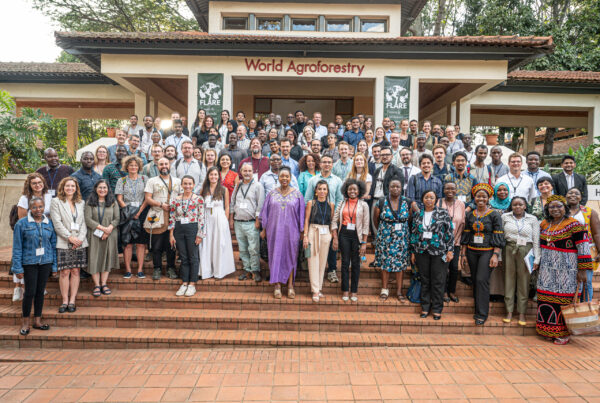
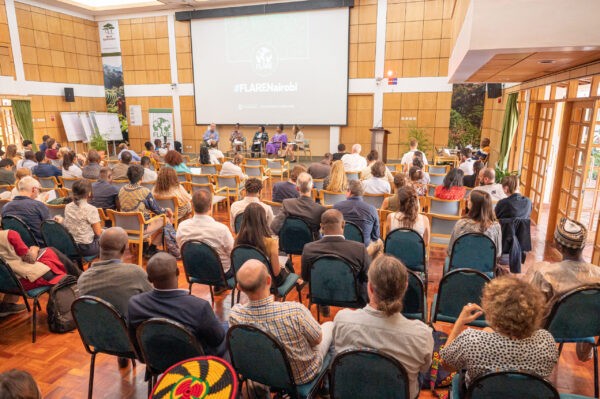
2023 FLARE Annual Meeting - Official Program and Book of Abstracts
2023 FLARE Annual Meeting Plenary Sessions
FLARE is proud to feature three plenary sessions at this year's Annual Meeting. These plenary sessions will also be available virtually via Zoom and are free to view. Mark your calendars for these exciting events! Please Note: All times listed are East African Time.
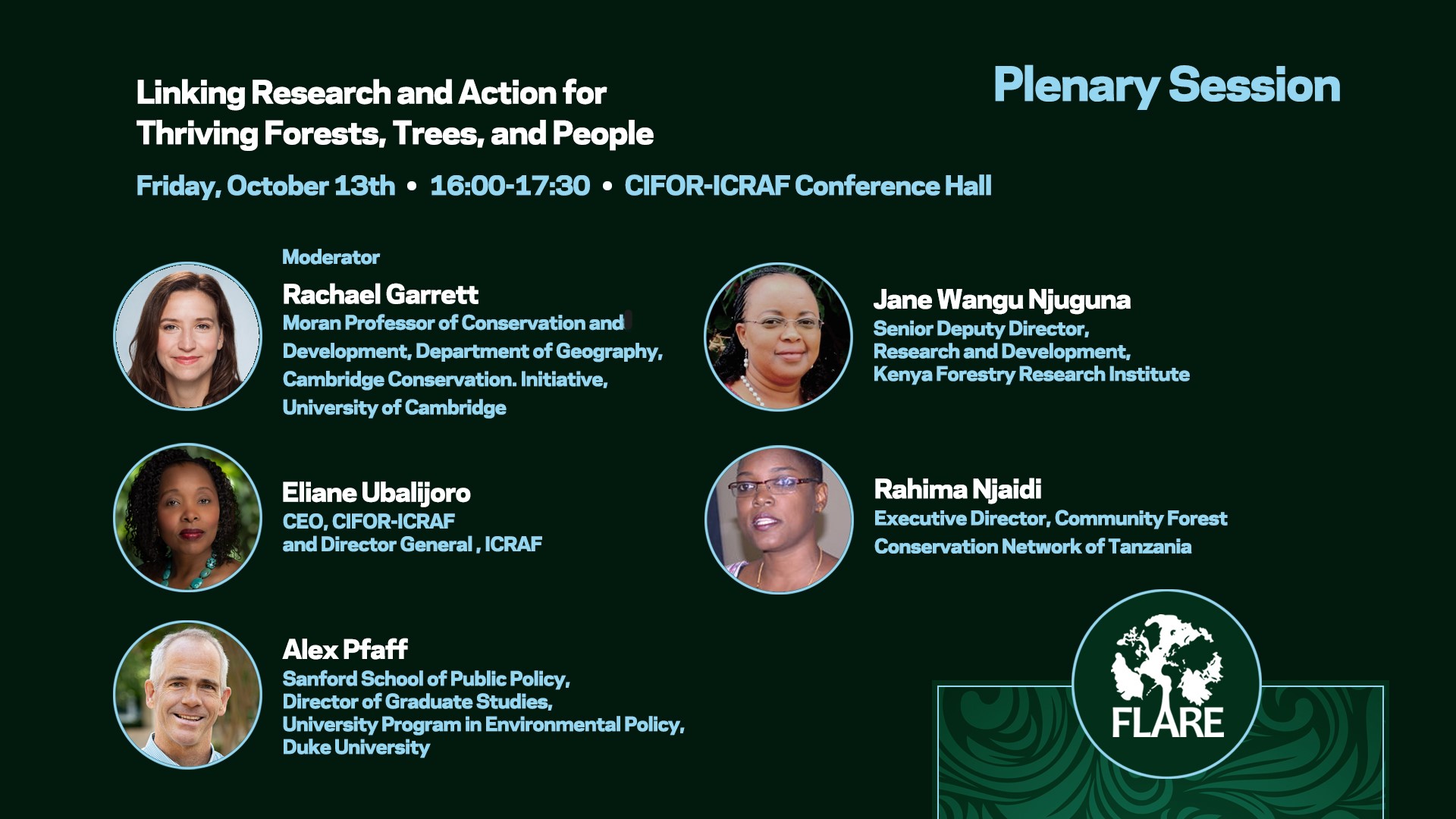
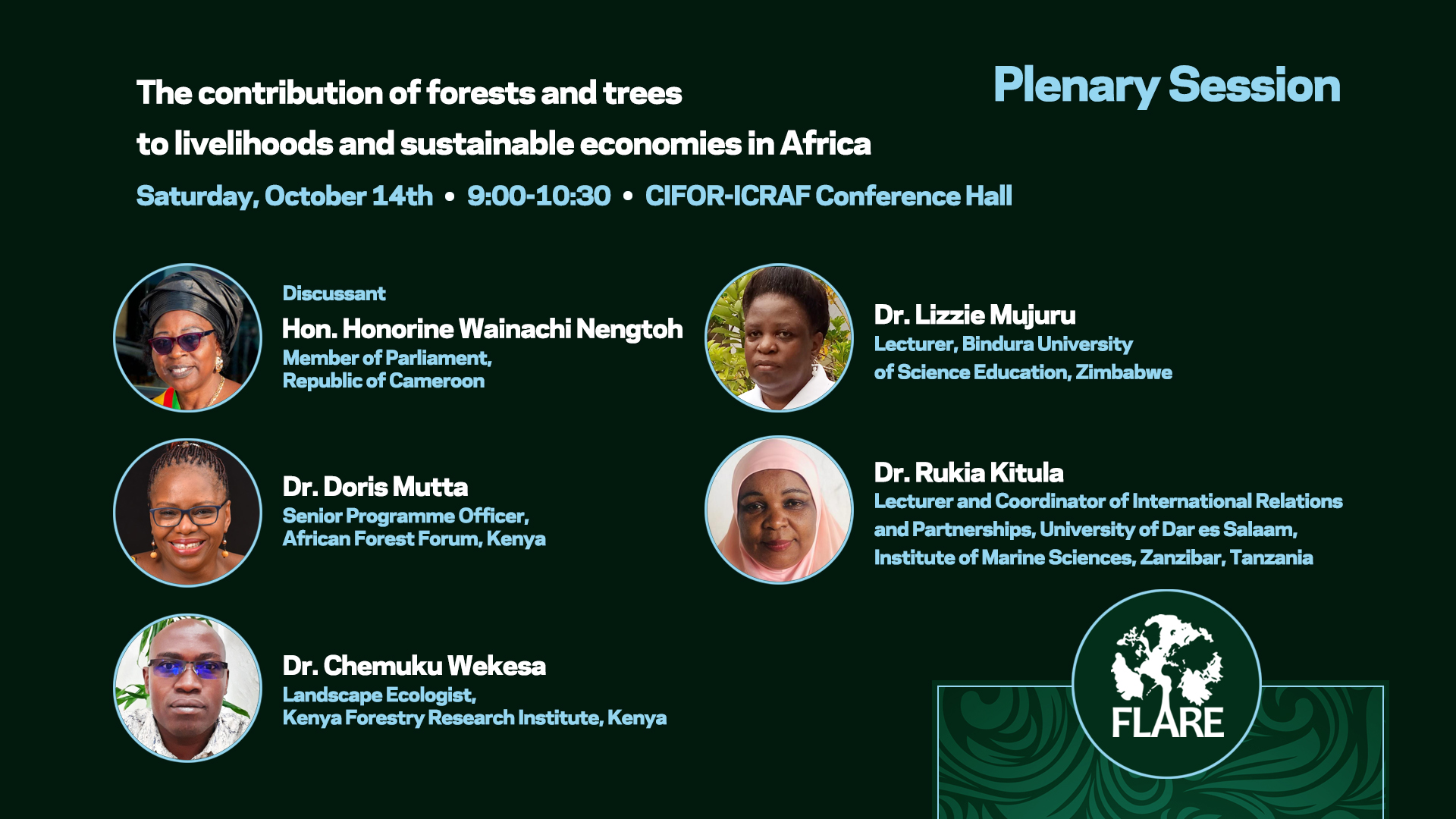
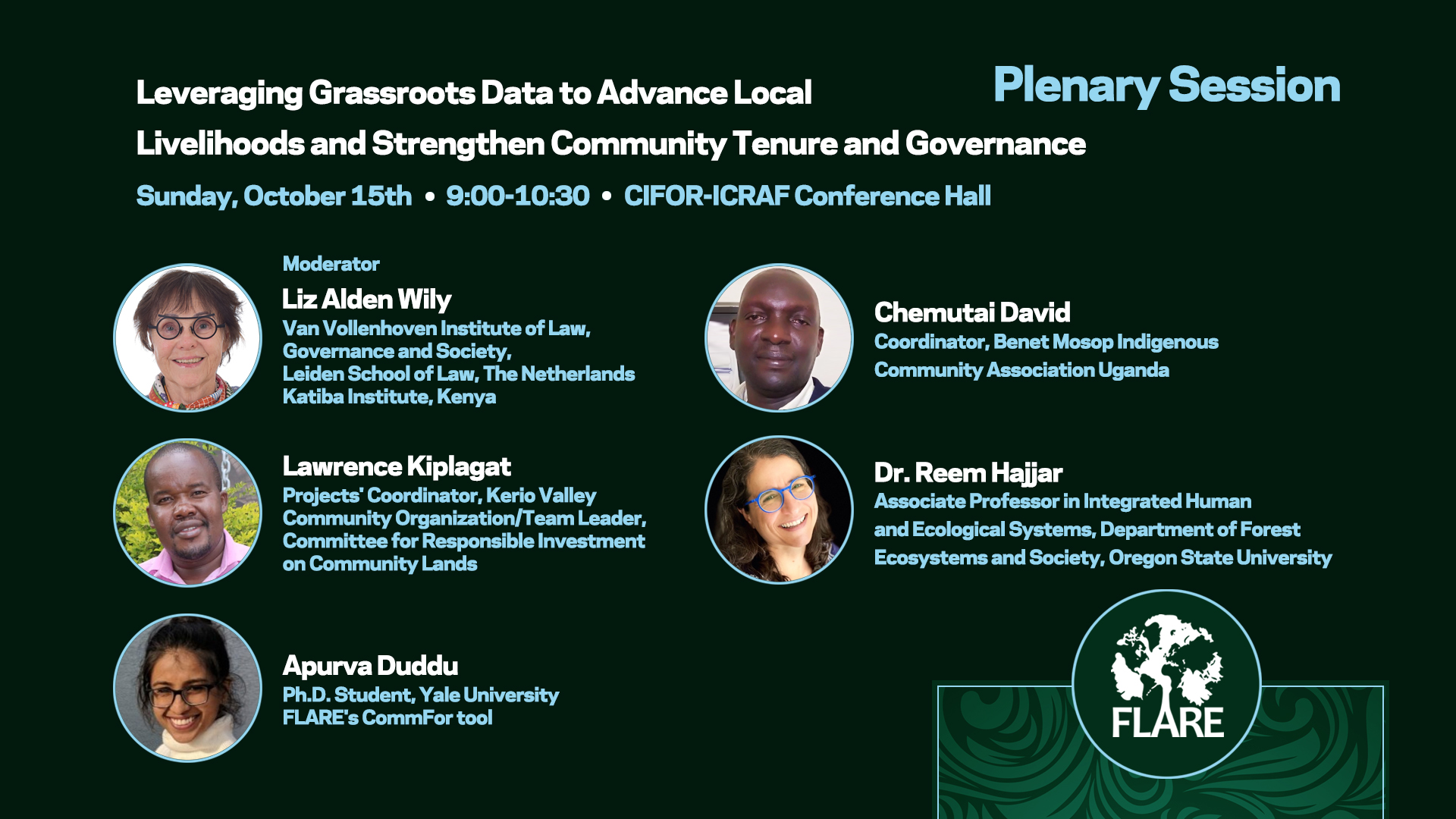
2023 Annual Meeting Registration - CLOSED
Please read before registering
To register for the 2023 Annual Meeting, please click the link the relevant option below. Meeting registration fees are based on a tiered structure according to country income level (World Bank Country Classifications). FLARE relies on registration fees to cover meeting costs and we therefore request that you register at the level corresponding to the country of your current primary institutional affiliation.
High Income Country | Early Bird (6/20-7/3) | Regular (7/4 - 9/4) | Late (9/5-10/15) |
|---|---|---|---|
Observer | $465 | $540 | $690 |
Presenter (any form of presentation) | $490 | $565 | $640 |
Student Observer (Graduate and Undergraduate) | $240 | $340 | $390 |
Student presenter (any form of presentation; graduate and undergraduate) | $265 | $365 | $440 |
Poster (Rate applies to all) | $240 | $290 | $390 |
Workshops (per workshop) (Monday, October 16, 2023) | $50 | $100 | $125 |
Upper Middle Income Country | Early Bird (6/20-7/3) | Regular (7/4 - 9/4) | Late (9/5-10/15) |
|---|---|---|---|
Observer | $305 | $405 | $480 |
Presenter (any form of presentation) | $350 | $425 | $525 |
Student Observer (Graduate and Undergraduate) | $180 | $280 | $330 |
Student presenter (any form of presentation; graduate and undergraduate) | $200 | $300 | $375 |
Poster (Rate applies to all) | $180 | $230 | $330 |
Workshops (per workshop) (Monday, October 16, 2023) | $50 | $75 | $100 |
Low & Lower Middle Income Country | Early Bird (6/20-7/3) | Regular (7/4 - 9/4) | Late (9/5-10/15) |
|---|---|---|---|
Observer | $140 | $190 | $265 |
Presenter (any form of presentation) | $165 | $215 | $290 |
Student Observer (Graduate and Undergraduate) | FREE | FREE | $90 |
Student presenter (any form of presentation; graduate and undergraduate) | $90 | $115 | $165 |
Poster (Rate applies to all) | $65 | $90 | $115 |
Workshops (per workshop) (Monday, October 16, 2023) | $25 | $50 | $75 |
All Levels | Early Bird (6/20-7/3) | Regular (7/4 - 9/4) | Late (9/5-10/15) |
|---|---|---|---|
Welcome Reception | FREE | FREE | FREE |
Welcome Reception Partner Ticket (Not attending conference) | $30 | $30 | $30 |
Conference Dinner | $75 | $75 | $75 |
Partner Dinner Ticket (Not attending conference) | $75 | $75 | $100 |
Also consider registering for the GLF Nairobi 2023 Hybrid Conference: A New Vision for Earth. Please note, this conference is a separate event and will immediately proceed the 2023 FLARE Annual Meeting.
Presentation and Poster Guidelines
Please review the guidelines before submitting your presentation.
Presentation Submission Link
2023 Annual Meeting Theme
Linking Research and Action for Thriving Forests, Trees, and People
Research can play a key role in advocacy and action to address climate change, reduce vulnerability, conserve forests, and foster human development. For example, evidence accumulated over decades has demonstrated the critical role of Indigenous Peoples and Local Communities in protecting and sustainably managing forests and, in turn, helped lead to government recognition of community land rights and new funding flows. More generally, impact assessments of different forest-related interventions have helped improve policy design.
Yet too often research has been ineffective in fostering change – or reforms benefitting communities and forests inspired and honed by research have been clawed back by forest services and other interested parties. Too often, even when research reveals options and abuses, key findings are hidden behind a paywall, suppressed by threatened parties, or are couched in specialist language that obscures their practical relevance, among other barriers. The result is that knowledge relevant to tackling the urgent challenges of climate change, biodiversity loss, poverty alleviation and other social ills often remains unused. What can we do to confront such obstacles? How can research—and researchers—make a difference?
FLARE 2023 will explore these questions and seeks to make concrete progress toward better harnessing research for action. Doing so will require dialogue and collaboration among scientists, government officials, concerned citizens, activists and advocates, business leaders, journalists, and others.
Therefore, proposals for FLARE 2023 are particularly welcome that:
- Include collaboration between researchers and other actors mentioned above,
- Involve early career scholars and practitioners, including in intergenerational partnerships,
- Are led by scholars from low- and middle- income countries/the Global South.
And that:
- Address barriers to effective use of research in policy and practice and means to overcome them,
- Document and explain the exclusions of research from arenas where it could result in better forest management or improve lives and livelihoods,
- Present cases of positive policy change that reflect good practice in research uptake,
- Demonstrate collaborative approaches that have worked to bridge divides and/or show promise to do so,
- Provide examples of collective action for systemic change that favors thriving human communities and forest landscapes, and/or
- Highlight the voices, challenges, and successes of those who suffer most from forest loss and degradation, climate and environmental change, and restrictive policies.
2023 Annual Meeting Sub-Themes
Frequently Asked Questions
Have a question relating to the 2023 FLARE Annual Meeting? Please review the section below to find your answer!
The advice from the Ministry of Foreign Affairs to those short-term visitors to ICRAF is to apply for a Kenya entry visa online through www.ecitizen.go.ke. First, select your visa type as "single entry." Later it will ask "applicants reason for travel," then select "tourism." You will then upload your return ticket and hotel booking.
You do not require a Letter of Invitation to enter Kenya for the 2023 FLARE Annual Meeting. Once again, the advice from the Ministry of Foreign Affairs to those short-term visitors to ICRAF is to apply for a Kenya entry visa online through www.ecitizen.go.ke. First, select your visa type as "single entry." Later it will ask "applicants reason for travel," then select "tourism." You will then upload your return ticket and hotel booking.
Please inform the Secretariat if you encounter any issues in obtaining a visa for Kenya. You may apply for an entry visa online through www.ecitizen.go.ke.
If you need a Letter of Invitation for internal purposes, please reach out to the Secretariat at flare@nd.edu. One will be provided within 3 business days of the original request.
The deadline to register as a presenter is September 4th, 2023. Please notify the FLARE Secretariat at flare@nd.edu if you plan to attend and present at the Annual Meeting but are unable to register by September 4th.
Your presentation is due by Sunday, October 8th. Further instructions on how to submit your presentation, as well as presentation guidelines, will be released after the presenter registration deadline.
The FLARE Annual Meeting will be primarily an in-person event with only the plenary events being live-streamed online.
Online participation may be available to presenters but only in an emergency situation. Please contact the Secretariat at flare@nd.edu for more information about presenters. Online participation of the parallel sessions for observers will not be available.
Due to an unforeseen delay, the financial assistance decisions will not be made until the end of July. Thank you for your patience with this matter.
Event Deadlines & Timeline
Subject to Change
event | date |
|---|---|
May 15, 2023 | Abstracts submissions due |
June 5, 2023 | Decision notifications on abstracts |
June 20, 2023 | Early bird registration begins |
July 4, 2023 | Early bird ends; regular registration begins |
September 5, 2023 | Deadline for presenters to register; regular registration rates end and late registration begins |
October 5, 2023 | Last day to register for the 2023 Annual Meeting |
October 11, 2023 | Submission deadline for meeting presentations |
October 12, 2023 | Opening Reception |
October 13-15, 2023 | Presentations, speakers and other plenary events |
October 15, 2023 | Dinner at Jiko Restaurant (advanced ticket required) |
October 16, 2023 | Optional workshops |
2023 Coordination Committee
Festus Amadu, Florida Gulf Coast University
Juan Pablo Sarmiento Barletti, CIFOR-ICRAF
Rayna Benzeev, University of California, Berkeley
Ida N. S. Djenontin, Pennsylvania State University
Houria Djoudi, CIFOR-ICRAF
Michael Dougherty, CIFOR-ICRAF
Amy Duchelle, Food and Agriculture Organization
J.T Erbaugh, Dartmouth College
Forrest Fleischman, University of Minnesota
Anja Gassner, Global Landscapes Forum
Pamela Jagger, University of Michigan
Daniel Miller, University of Notre Dame
Doris Mutta, African Forest Forum
Katia Nakamura, University of Notre Dame
Pete Newton, University of Colorado at Boulder
Johan Oldekop, University of Manchester
Rose Pritchard, University of Manchester
Pushpendra Rana, Indian Forest Service
Jesse Ribot, American University
Laura Sauls, George Mason University
Etotépé Sogbohossou, University of Senghor & University of Abomey-Calavi
Judith Sonneck, Global Landscapes Forum
Gladman Thondhlana, Rhodes University
Jennifer Zavaleta Cheek, South Dakota State University


